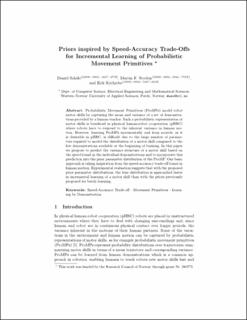| dc.contributor.author | Schäle, Daniel | |
| dc.contributor.author | Stølen, Martin Fodstad | |
| dc.contributor.author | Kyrkjebø, Erik | |
| dc.date.accessioned | 2022-03-23T09:23:19Z | |
| dc.date.available | 2022-03-23T09:23:19Z | |
| dc.date.created | 2021-11-28T20:39:03Z | |
| dc.date.issued | 2021 | |
| dc.identifier.citation | Schäle, D., Stølen, M. F., & Kyrkjebø, E. (2021). Priors inspired by speed-accuracy trade-offs for incremental learning of Probabilistic Movement Primitives. In C. Fox, J. Gao, A. Ghalamzan Esfahani, M. Saaj, M. Hanheide, & S. Parsons (Eds.), Towards autonomous robotic systems (pp. 273–283). Springer International Publishing. | en_US |
| dc.identifier.issn | 0302-9743 | |
| dc.identifier.uri | https://hdl.handle.net/11250/2987004 | |
| dc.description | This version of the article has been accepted for publication, after peer review (when applicable) and is subject to Springer Nature’s AM terms of use, but is not the Version of Record and does not reflect post-acceptance improvements, or any corrections. The Version of Record is available online at: https://doi.org/10.1007/978-3-030-89177-0_28 | en_US |
| dc.description.abstract | Probabilistic Movement Primitives (ProMPs) model robot motor skills by capturing the mean and variance of a set of demonstrations provided by a human teacher. Such a probabilistic representation of motor skills is beneficial in physical human-robot cooperation (pHRC) where robots have to respond to the inherent variance in human motion. However, learning ProMPs incrementally and from scratch, as it is desirable in pHRC, is difficult due to the large number of parameters required to model the distribution of a motor skill compared to the few demonstrations available at the beginning of training. In this paper we propose to predict the variance structure of a motor skill based on the speed found in the individual demonstrations and to incorporate this prediction into the prior parameter distribution of the ProMP. Our basic approach is taking inspiration from the speed-accuracy trade-off found in human motion. Experimental evaluation suggests that with the proposed prior parameter distributions, the true distribution is approached faster in incremental learning of a motor skill than with the priors previously proposed for batch learning. | en_US |
| dc.language.iso | eng | en_US |
| dc.publisher | Springer | en_US |
| dc.title | Priors Inspired by Speed-Accuracy Trade-Offs for Incremental Learning of Probabilistic Movement Primitives | en_US |
| dc.type | Chapter | en_US |
| dc.type | Peer reviewed | en_US |
| dc.description.version | acceptedVersion | en_US |
| dc.source.pagenumber | 273-283 | en_US |
| dc.source.volume | 13054 | en_US |
| dc.source.journal | Lecture Notes in Computer Science (LNCS) | en_US |
| dc.identifier.doi | 10.1007/978-3-030-89177-0_28 | |
| dc.identifier.cristin | 1960391 | |
| dc.relation.project | Norges forskningsråd: 280771 | en_US |
| cristin.ispublished | true | |
| cristin.fulltext | postprint | |
| cristin.qualitycode | 1 | |
